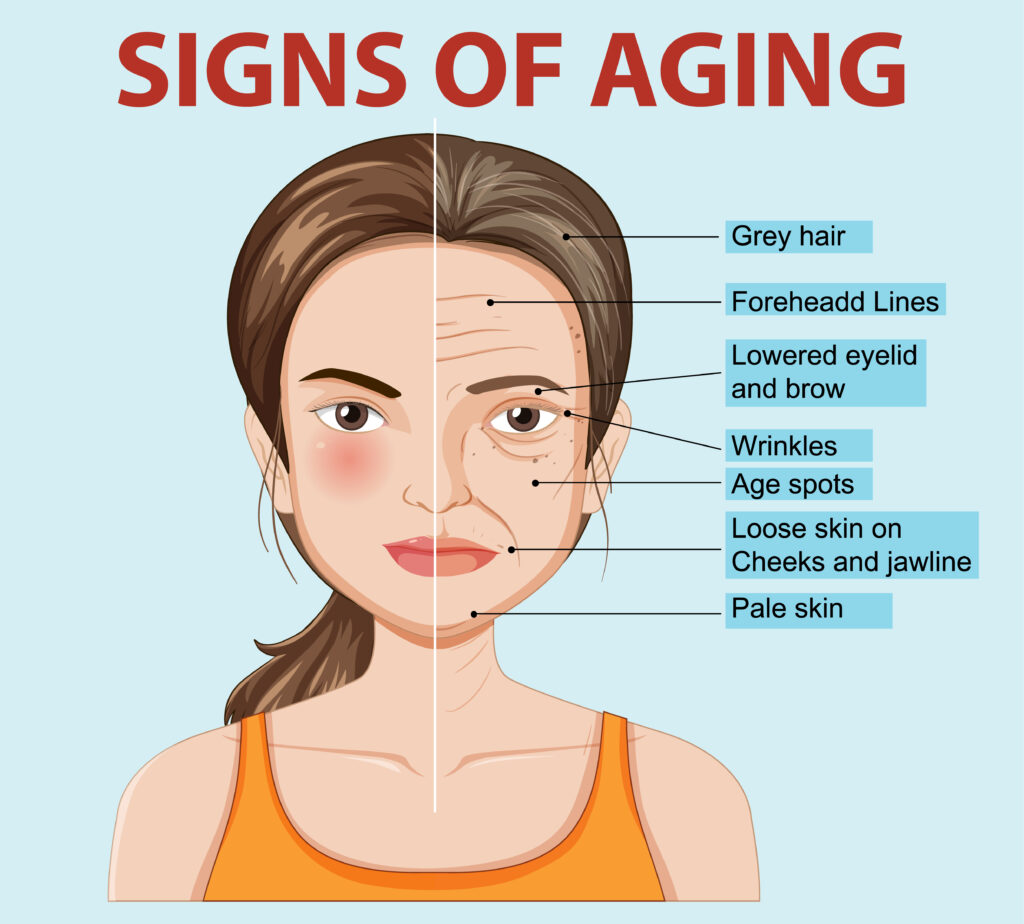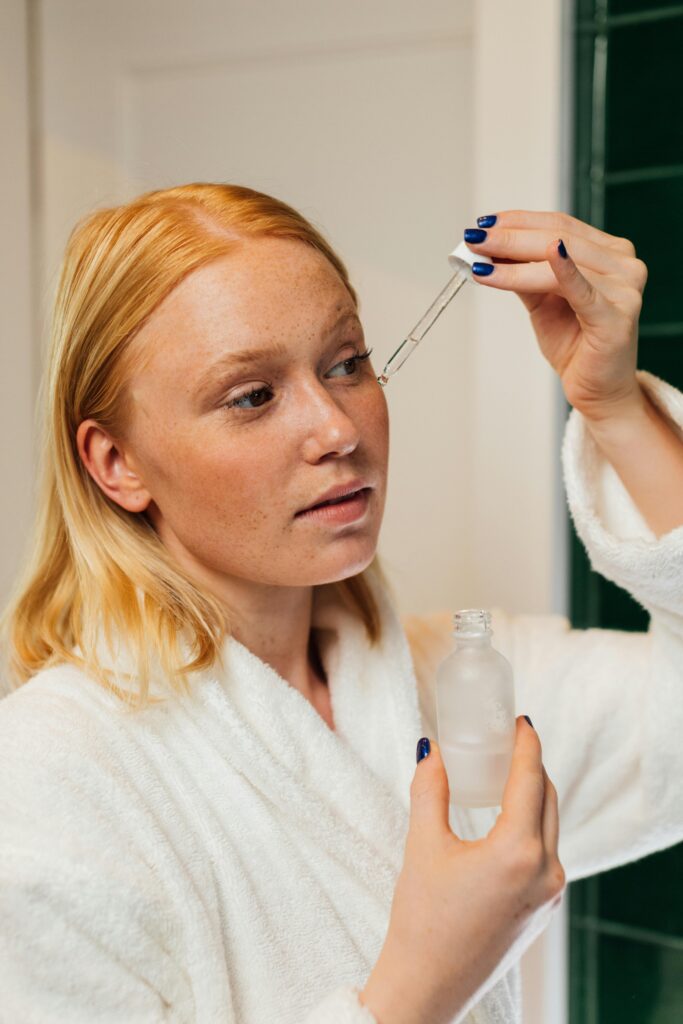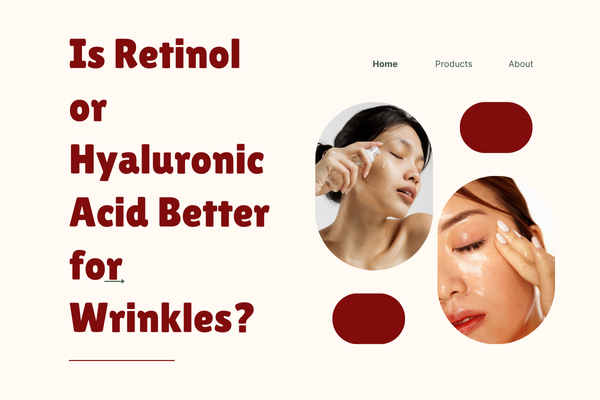When it comes to fighting wrinkles and maintaining youthful, radiant skin, two ingredients stand out in the skincare world: retinol and hyaluronic acid. Both are incredibly popular, but they serve different purposes and work in unique ways. If you’re wondering which is better for reducing wrinkles, this comprehensive guide will help you decide. We’ll dive into the science, benefits, and use cases for both, so you can make an informed choice tailored to your skin’s needs.
Lets see, Is Retinol or Hyaluronic Acid Better for Wrinkles?
before looking for the answer of Is Retinol or Hyaluronic Acid Better for Wrinkles? We have to discuss Retinol and Hyaluronic acid separately.
What is Retinol?
Retinol, a derivative of vitamin A, is one of the most researched and recommended ingredients for addressing signs of aging. It works by stimulating collagen production and promoting skin cell turnover.
Key benefits of retinol:
- Reduces fine lines and wrinkles: By boosting collagen production, retinol helps to smooth out existing wrinkles and prevent new ones from forming.
- Improves skin texture: Its exfoliating effect reveals fresher, healthier skin.
- Fades hyperpigmentation: Retinol can lighten dark spots caused by sun damage or aging.
- Controls acne: Originally used to treat acne, retinol unclogs pores and reduces breakouts.
However, retinol can sometimes cause dryness, redness, or irritation, especially when you’re first introducing it to your skincare routine. That’s why it’s essential to start with a low concentration and gradually increase usage.
What is Hyaluronic Acid?
Hyaluronic acid is a naturally occurring substance in the body, known for its exceptional ability to retain moisture. Unlike retinol, which actively changes your skin’s behavior, hyaluronic acid works as a humectant to hydrate and plump your skin.
Key benefits of hyaluronic acid:
- Deep hydration: It holds up to 1,000 times its weight in water, making it perfect for dry or dehydrated skin.
- Plumps the skin: By replenishing moisture, hyaluronic acid can reduce the appearance of fine lines and wrinkles.
- Soothes irritation: Its gentle, non-reactive nature makes it suitable for sensitive skin.
- Enhances skin elasticity: Well-hydrated skin is more elastic, helping to prevent wrinkles from forming.
Hyaluronic acid is generally well-tolerated by all skin types and can be used daily, even alongside other active ingredients.
You can learn more about Hyaluronic acid here.
How Do Retinol and Hyaluronic Acid Work on Wrinkles?
The key difference lies in how they address wrinkles. Retinol actively reduces the depth and appearance of wrinkles by stimulating collagen and accelerating skin renewal. It targets the root cause of wrinkles: loss of collagen and skin elasticity.
Hyaluronic acid, on the other hand, plumps and hydrates the skin, making fine lines less noticeable. While it doesn’t directly stimulate collagen, it provides an instant smoothing effect by improving skin hydration levels.
Retinol: The Wrinkle-Fighting Superstar

Retinol’s ability to transform skin at a cellular level makes it highly effective for long-term anti-aging. By increasing collagen production and encouraging the turnover of old skin cells, it addresses deeper wrinkles and other signs of aging.
Who Should Use Retinol?
- Those with visible wrinkles and fine lines.
- Individuals looking to reduce acne and improve skin texture.
- People who want to target hyperpigmentation or sun damage.
How to Use Retinol for Best Results
- Start slow: Use it 2-3 times a week at night.
- Pair with a moisturizer: Retinol can be drying, so follow up with a hydrating cream.
- Always use sunscreen: Retinol increases sensitivity to UV rays, so SPF is non-negotiable.
Hyaluronic Acid: The Hydration Hero

Hyaluronic acid focuses on restoring moisture levels, making it ideal for dehydrated or dry skin. Though its effects on wrinkles are temporary, they are immediate and noticeable.
Who Should Use Hyaluronic Acid?
- Individuals with dry or dehydrated skin.
- Those looking for a gentle, soothing product.
- Anyone who wants an instant plumping effect for fine lines.
How to Use Hyaluronic Acid for Best Results
- Apply to damp skin: This helps lock in moisture.
- Layer with other products: It works well with serums, moisturizers, and sunscreens.
- Use daily: Morning and evening applications maximize its hydrating effects.
Can You Use Retinol and Hyaluronic Acid Together?
Yes, and in fact, pairing these two ingredients can deliver powerful results. Retinol may dry out the skin, while hyaluronic acid provides the hydration needed to counteract this side effect. Together, they create a balanced skincare routine that addresses both the cause and appearance of wrinkles.
How to Combine Them Safely
- Apply hyaluronic acid first: This creates a hydrated base for retinol.
- Use retinol at night: Retinol is best applied before bed, as it can increase sensitivity to sunlight.
- Follow with a moisturizer: Seal in the benefits of both ingredients with a nourishing cream.
Is Retinol or Hyaluronic Acid Better for Wrinkles? and Which is Better ?
The answer depends on your skin type and specific needs.
Choose retinol if:
- You have visible wrinkles and fine lines that need targeted treatment.
- Your goal is long-term anti-aging results.
- You can commit to a consistent skincare routine.
Choose hyaluronic acid if:
- Your skin is dry, sensitive, or dehydrated.
- You want immediate hydration and plumping effects.
- You’re looking for a gentle product suitable for daily use.
Real-Life Results: What to Expect
Retinol typically takes 3-6 months to show visible improvements in wrinkles, but the results are long-lasting. Hyaluronic acid works instantly, reducing the appearance of fine lines by plumping and hydrating the skin. However, its effects are temporary and need regular application to maintain.
The Verdict
Both retinol and hyaluronic acid have their place in an effective anti-aging routine. Retinol offers long-term wrinkle reduction, while hyaluronic acid provides immediate hydration and plumping. Instead of choosing one over the other, consider incorporating both into your skincare regimen for the best of both worlds.
Conclusion
So, is retinol or hyaluronic acid better for wrinkles? The short answer is: it depends on your skin’s unique needs. For long-term anti-aging benefits, retinol is the clear winner, but if hydration and plumping are your primary concerns, hyaluronic acid is your go-to. Ultimately, a combination of both ingredients can give you the comprehensive results you’re looking for—smoother, healthier, and more youthful skin.

